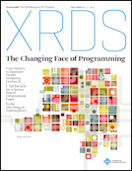 | |
| Editor | Julia Gersey |
|---|---|
| Categories | Computer science |
| Frequency | Quarterly |
| Circulation | ~50,000 (online access) ~10,000 (printed version) |
| Publisher | Association for Computing Machinery |
| First issue | Fall 1994 |
| Country | USA |
| Based in | New York City |
| Language | English |
| Website | http://xrds.acm.org/ |
| ISSN | 1528-4972 |
XRDS, formerly Crossroads, is the flagship academic magazine for student members of the Association for Computing Machinery (ACM). Issues focus on computer science topics and are published quarterly in both print and electronic forms. The magazine is distributed to tens of thousands of students worldwide. The full text of every issue is available online to ACM members through the ACM Digital Library, with many articles selected by the editorial staff open to the general public. The first edition was published in 1994(ACM 2010) and was ACM's first electronically produced publication, originally being distributed in HTML. It is run by a group of volunteer students and supported by staff at ACM headquarters in New York City. XRDS employs a mixed invited and unsolicited submissions model, which are refereed by a staff of permanent editors.(ACM 2010b) Issues exist for every quarter since Fall 1994, with a few extra, mid-Summer, issues.(ACM 2010c)